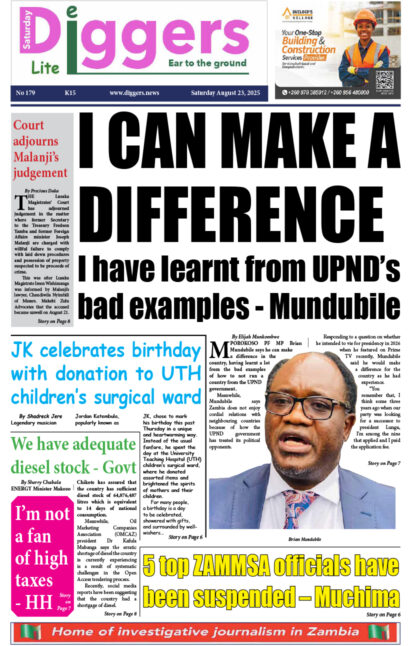ZAMBIA has slid into an autocracy and financial ruin akin to that of Zimbabwe and citizens must brace for more economic turmoil, says Alliance for Democracy and Development (ADD) president Charles Milupi.
And Milupi says Zambia defaulted on its debt obligations the moment the country asked for deferment on interest payments two months ago.
In an interview, Milupi cited the increasing inflation rate, depreciating kwacha and poor quality of life as factors that proved that Zambia was not different from neighbouring Zimbabwe, which experienced hyperinflation over a decade ago.
“The bigger story is that whether the bondholders agreed or not, we are already in severe economic problems in this country. The budget is a non-budget; the economy has grounded to a halt on account of a number of factors. It’s very difficult to get anything done now unless you are known, unless you can bribe. These are the conditions for grinding down the economy. Those in government must understand that when they allow so much corruption; when they allow so much that you have to belong to a certain group for you to be able to do anything; when you allow over-regulation, they just sit there to make sure that a number of people are not allowed to function. You cannot have a one-sided economy and expect it to boom. We are already sinking. The PF government has totally failed to run an economy,” Milupi said.
“Also, people understand that when you are in an election year like going into 2021, government will try to spend when conditions dictate that we should try to cut spending. And government here is eager to spend; you can see all these empowerment funds that you see, where is the money coming from? We have no money in the budget so where is this money coming from? They want to appear popular when in fact they are killing the economy even further. We are paying a heavy price for them having mismanaged the economy, procuring projects that are extremely expensive. So, we are literally on the path to the conditions prevailing in Zimbabwe. Just look at the inflation, the kwacha is losing its value every single day. This is exactly what was happening in Zimbabwe. Look at the quality of life that people are being exposed to, this is exactly Zimbabwe. Very soon, we will be like them. And the citizens must brace themselves. Without a doubt, that’s where we are going. We are just like them. And this government is too stubborn to listen. But we are on our way to the Zimbabwe situation.”
He said Zambia defaulted on its debt obligations in September when it made a request for deferment of interest payments.
“My view on this matter is that the moment we asked for deferment, from that moment, we had already defaulted. Because if I owe money and I tell you that, ‘I will pay towards the end of the month,’ and towards the end of the month I say, ‘I will not be able to pay, can you give me up to the fifteenth…’ It means I have failed to pay at the end of the month, it means I have defaulted! All I’m picking is an agreement from you to default. So, as far as I am concerned, we are already in default. In terms of these bondholders, we, in the opposition, have been saying for a very long time since last year when government wanted to get US $1.3 billion from the IMF, we said they are not going to give you,” Milupi said.
“… with these conditions [that are prevailing], there is no way a multilateral institution owned by the West can lend money to us. When you lend money, you make sure that there is accountability. In terms of government, accountability comes from institutions, like Parliament, institutions like DEC, institutions like ACC, institutions like FIC. And also the opposition, you have to have a strong opposition.”
He said it was impossible for bondholders to give government the much-needed relief on interest payments as it lacked accountability.
“When a government now sets out to weaken all these institutions, it means there is no accountability and these multilaterals, these lenders from outside, they can see that there is no accountability. So, there is no way they will lend that money if there is no accountability. Secondly, if you are an over-borrowed country, now we are talking about US $27 billion and more in debt, you know that whenever you give an over-borrowed person, they will not be able to pay back,” said Milupi.
“And thirdly, when you now have issues in the economy, like load shedding, it’s a pity government doesn’t understand that when you curtail people’s access to electricity, you are basically affecting their output and if you’re affecting their output, you are affecting the economy. It’s from the companies’ output, individuals’ output that you get growth in the economy. All these factors showed you that the lenders will not lend you money; the bondholders will not give you relief. All they will try to do is ensure that they squeeze whatever little we have.”
























